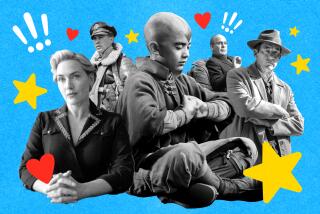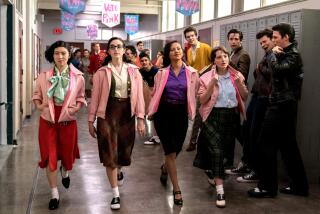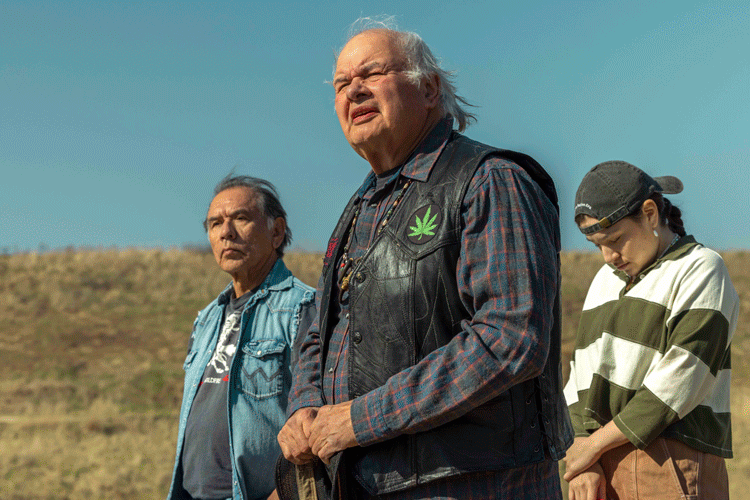Pinch-Hitters Score When Inserted in the Lineup : Television: Networks rely on such dependable two-hour movies as ‘Perry Mason’ and ‘Columbo’ to help in the ratings. ‘Familiarity is very important to viewers,’ executives say.
- Share via
Call them TV’s premier pinch-hitters.
They are the dependable, two-hour movies--most of them old pros like the “Perry Mason” mysteries, “Columbo” and “Matlock”--that the networks in recent years have called on to keep afloat in the ratings, often when they’re in trouble and new series have gone belly-up.
There are various reasons for keeping the familiar two-hour staples around. Most of them center around the fact that you can count on them to come off the bench and deliver because viewers who are otherwise fed up with reality shows and other TV trends are familiar with the dependable storytelling.
The two-hour “Perry Mason” revivals transcended the pinch-hitter category by becoming surprising hits on their own. And the networks continue to develop the form to fit their needs. NBC’s Danielle Steele romances, for example, have also succeeded and are great counter-programming against sports.
But it’s also important for the networks to develop more contemporary series as two-hour regulars when their weekly prime-time hours run out.
On May 21, for example, ABC brings back one of its sleeper series, “MacGyver,” for a two-hour Saturday outing, once again starring Richard Dean Anderson and dealing with “an archeological adventure to locate a legendary fortune.”
ABC is confident that the “MacGyver” revival during the key May sweeps will also provide support from “a faithful audience” to promote its movie that airs the next night, “City Slickers,” says Alan Sternfeld, the network’s senior vice president for program planning and scheduling.
The nice thing about pre-sold two-hour entries in general, says NBC executive Preston Beckman, is that “you have fewer sleepless nights. You generally know where you’re going to wind up (in the ratings).
“Familiarity is very important to viewers,” says Beckman, senior vice president of program planning and scheduling for NBC. “Another value is that it takes pressure off promotion because, for instance, you don’t have to sell a ‘Perry Mason’ movie.”
There’s a certain added drama that goes with pinch-hitting, whether in baseball or TV. “Matlock,” bounced by NBC, showed its continuing pull when given a shot at ABC. Dick Van Dyke’s new CBS series, “Diagnosis Murder,” started as a two-hour fill-in and won a regular berth.
“Generally, the audience comes back to people they already have a relationship with,” says Peter Tortorici, the executive vice president of CBS Entertainment. “And sure, the programs are great pinch-hitters.”
When shows such as Van Dyke’s win regular slots, says Beckman, it’s like “doing a pilot and letting the public judge if this should be a series.”
“It’s a good testing ground for networks without committing themselves,” says Kim Haswell, vice president of programs for Fred Silverman Productions, which has turned out a number of series and two-hour specials featuring old favorites.
The flip side on the production end, says Haswell, is that “a one-hour series can become very expensive and they’re hard to sell in syndication. So the profit really isn’t there. If you do a two-hour film, you can sell it overseas as a movie.”
The trick, of course, is to keep coming up with more recent shows that will play over a long period as two-hour specials. In past years, CBS has continued to get mileage out of the grand old “Gunsmoke” series with new, periodic adventures. But at the same time, “Cagney & Lacey” producer Barney Rosenzweig is planning at least several new two-hour films of the series, reuniting stars Tyne Daly and Sharon Gless.
With producers such as Steven Bochco noting that viewers are defecting to cable and pay-TV in large part because of movies, the two-hour network films are also a valuable weapon in retaining the fickle audience.
NBC, for instance, has been getting mileage by developing its line of specials entitled “In the Line of Duty.” As for the better-known series that have dominated this programming arena, from “Perry Mason” to “Columbo,” Sternfeld says, “The reason they worked again and again is that they’re well-made.”
A good two-hour TV film based on a well-loved series with a popular star is a program for all seasons. It’s as valuable as having a super utility player on call in baseball.
If “Hart to Hart” and “Burke’s Law” can have comebacks, as they have this season, you have to think of some of the dramas of both the distant and recent past that would still have plenty of gold to mine--with a new look.
You could bet, for instance, that several, or more, two-hour films annually of “The Rockford Files,” with James Garner, would be hugely welcomed and would go through the ratings roof.
How about Richard Chamberlain, in middle age, in a revival of the “Dr. Kildare” series that first brought him fame?
At a recent Los Angeles tribute to “Lou Grant” by the New York Museum of Television & Radio, mention was made of an attempt to do a new TV film of the classic series. Two or three a year would be more like it.
An annual special updating the characters of “thirtysomething” could go on for years. “The Waltons” has been replayed by CBS before, but several a year would still be welcome.
When Angela Lansbury finally quits “Murder, She Wrote,” can you imagine the tune-in if she returns in occasional two-hour specials?
You could clean up with annual revivals of “Hawaii Five-O” or “Magnum, P.I.” or “Simon & Simon?” Alas, we’ll probably never get an updated look at Bruce Willis and Cybill Shepherd in “Moonlighting.” But in a few years, we’ll probably be ready for two-hour specials about whatever happened to the gang in “Beverly Hills, 90210.”
The extraordinary industry that has evolved from “Star Trek”--in films and TV variations--will probably never be matched. But there’s still gold in those prime-time hills.
More to Read
The complete guide to home viewing
Get Screen Gab for everything about the TV shows and streaming movies everyone’s talking about.
You may occasionally receive promotional content from the Los Angeles Times.






